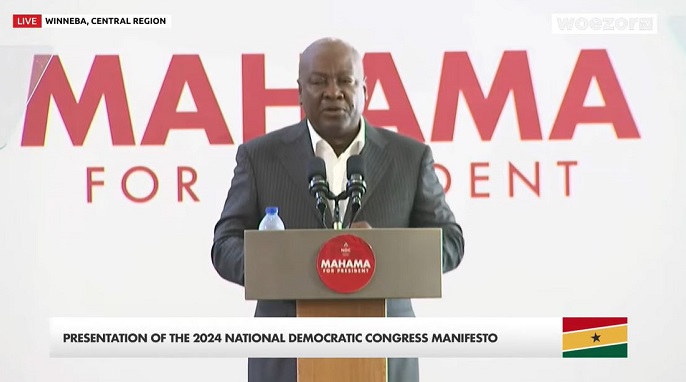John Dramani Mahama, the flagbearer of the National Democratic Congress (NDC), has unveiled a bold initiative in his latest manifesto, drawing significant attention and enthusiasm from party supporters. The manifesto, launched in Winneba, outlines a comprehensive plan to rejuvenate various sectors of the economy and send a strong political message of acceptance.
The manifesto highlights a broad economic agenda focused on digitization, hospitality, the automobile and transport sectors, the poultry industry, and security. It emphasizes the concept of a “twenty-four-hour economy” aimed at driving growth and efficiency.
A key component of the plan involves leveraging the economic comparative advantages of different regions, particularly in agriculture, to combat food inflation. The proposed mechanized agriculture program includes initiatives to support year-round farming through improved irrigation schemes.
Looking ahead, Mahama has sharply criticized the New Patriotic Party (NPP), labeling its administration as the “biggest political scam” in Ghana’s history since independence in 1957. He accused the NPP of undermining the country’s development and failing to live up to its promises.
Speaking at the NDC manifesto launch at the University of Education, Winneba, on Saturday, August 24, Mahama stated, “The NPP administration has been the biggest political scam ever pulled on Ghanaians. They were repackaged with enticing promises but have failed to deliver. Many Ghanaians will agree that Nana Addo Dankwa Akufo-Addo is the president Ghana never got, and his much-touted economic wizkid, Vice President Dr. Mahamadu Bawumia, is also the economic messiah Ghana never got.”
Mahama, who is seeking a return to the presidency, also accused the NPP of mismanaging Ghana’s energy sector. He recounted how the NPP government inherited a stabilized energy sector from his administration in January 2017, including nearly 800 megawatts of emergency power and a new energy sector levy act (ESLA) designed to generate GH¢3 billion annually to address legacy energy sector debts.
Story by: Alexander Kukah





